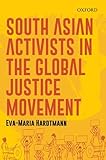South Asian activists in the global justice movement
By: Hardtmann, Eva-Maria.
Publisher: New Delhi Oxford University Press, 2017Description: xii, 248p.ISBN: 9780199466276.Subject(s): Political activities -- Social workers -- South Asia -- IndiaDDC classification: 303.4840954 Summary: This work is a well-researched study of the last decades of the networks in the Global Justice Movement (GJM) and World Social Forums. It offers a novel perspective on the traditions of protest, ethics, organizational forms, and visions among activists than is usually presented in the literature on GJM, which largely focuses on Latin America, the United States of America, and Europe. It is an ethnographically rooted account of the two conflicting discourses-one among activists in GJM and the other emanating from the World Bank-that have become intertwined locally within the same circle of activists. The author argues that local and transnational activist networks, no longer spatially and territorially limited, have become entangled with forces understood under the paradigms of 'neoliberalism', and relations among activists have changed in unexpected ways. Through a vivid description of transnational movements, this book aims to make evident the not-so-obvious yet intricate links between the World Bank, the United Nations, popular rock stars, and historical knowledge production among activists in South Asia and Japan in the twentieth and twenty-first centuries.| Item type | Current location | Call number | Status | Date due | Barcode |
|---|---|---|---|---|---|
 Books
Books
|
NASSDOC Library | 303.4840954 HAR-S (Browse shelf) | Available | 50147 |
Includes reference, index, about the author
This work is a well-researched study of the last decades of the networks in the Global Justice Movement (GJM) and World Social Forums. It offers a novel perspective on the traditions of protest, ethics, organizational forms, and visions among activists than is usually presented in the literature on GJM, which largely focuses on Latin America, the United States of America, and Europe. It is an ethnographically rooted account of the two conflicting discourses-one among activists in GJM and the other emanating from the World Bank-that have become intertwined locally within the same circle of activists. The author argues that local and transnational activist networks, no longer spatially and territorially limited, have become entangled with forces understood under the paradigms of 'neoliberalism', and relations among activists have changed in unexpected ways. Through a vivid description of transnational movements, this book aims to make evident the not-so-obvious yet intricate links between the World Bank, the United Nations, popular rock stars, and historical knowledge production among activists in South Asia and Japan in the twentieth and twenty-first centuries.


There are no comments for this item.